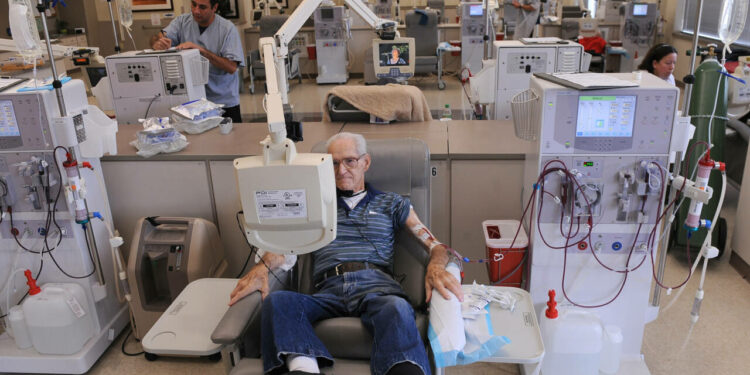Dr Arghya Majumdar, Director and Head, Dept. of Nephrology, AMRI Hospitals, Kolkata
New Delhi, March 09 (India Science Wire): There have been major natural disasters in the last few years, like the Indian Ocean earthquake, which triggered the boxing day tsunami, devastating communities along the coastline in 14 countries, and killing over 2 lakh people. The 2023 earthquake in Turkey and Syria caused widespread damage and killed over 50,000 people. The manufactured disasters like war and conflicts, prove equally devastating for the patients requiring treatment facilities in specialized centres, like dialysis for those suffering from Chronic Kidney Disease (CKD).
In 2021, natural disasters were estimated to have affected 101.8 million people worldwide, accounting for over 10,000 deaths. On the other hand, at the end of 2021, 89.3 million people worldwide were forcibly displaced from their homes. Calamitous unexpected events can also occur on a local level. The unexpected closure of roads, power, internet outages, and interruptions to steady water supplies can not only be a nuisance in a person’s daily life but also threaten a patient’s life.
To minimize the effects of disruption on health and medical care, there is a clear need to plan better and prepare for disasters of all magnitudes. With the complexities of kidney disease care and non-communicable diseases, health system resilience requires overarching multi-system policies and frameworks by which we can adequately prepare for combating and recovering from high-impact shocks.
The key is a framework for Public Health Emergency Preparedness (PHEP), that can easily be adapted and applied universally. It allows countries or health systems to more easily modify existing plans as per the type of catastrophe and environmental condition. A framework of PHEP has been evolved by a Canadian team of researchers that is empirically derived, end-user informed, and refined to ensure practice and policy relevance
for local or regional public health services.
A study conducted by the End-Stage Renal Disease National Coordinating Centre found that deaths among patients with chronic kidney disease exceeded the expected numbers by 6953–10316 during the early phases of the COVID-19 pandemic. Excess mortality was also noted in a subgroup analysis of patients who had received solid organ transplants.
Patients on dialysis are an especially vulnerable group in disasters. The severe consequences of a lack of access to a dialysis facility, coupled with an acceleration in demand for dialysis, as a result of Acute Kidney Injury (AKI) due to trauma and injury from unexpected events, can lead to a total failure of kidney services in an affected area.
The COVID-19 pandemic really strained all countries’ the healthcare facilities, especially for providing dialysis. In India, the challenges were enormous. During the three months of lockdown when no public or private transportation was available, dialysis patients had to rely on the help of family and friends to travel for treatment, with special passes. Few dialysis centres could provide proper isolation facilities. Some private hospitals denied these patients out-patient dialysis if they became positive and sent them to Government Infectious disease hospitals. Other hospitals insisted they would have to be admitted in COVID isolation beds to receive dialysis. Staff often lived in medical units to provide treatment.
The vulnerability of dialysis patients stands exposed in manufactured disasters such as war. In Ukraine, there are at present over 10,000 dialysis patients. More than 1500 patients are living with a transplanted kidney. More than 800 hospitals and medical facilities have been damaged since the beginning of the war, many of these were dialysis centres.
Due to a lack of disaster preparedness, dialysis patients were among the worst hit in the COVID-19 pandemic. Many Nephrology units initially struggled with fixing schedules, keeping patients safe, and providing dialysis to the affected patients. Gradually with increasing digital communications at multiple levels regarding handling of acute COVID cases, keeping other patients safe and getting everyone immunized, every hospital formulated its exclusive protocol. Many units implemented the rationalization approach, which involved goal-oriented workflows in serving the needs of dialysis for AKI, chronic maintenance dialysis, distancing requirements, and issues of consumable supply.
The Lancet COVID19 commission5 clearly outlined three areas for health system improvement:
(i) strengthening national health systems and stepping up investments in primary health care and public health;
(ii) clear national pandemic preparedness plans; and
(iii) adequate financing for sustainable development and green recovery plans.
Unexpected disasters, either natural or manufactured, of various magnitudes will continue to occur. Health systems need to be robust, adaptive, and resilient, incorporating the essential PHEP elements to gear up and function optimally in emergencies and disasters, keeping the interest of the most vulnerable population uppermost in mind. A vital component of PHEP, highlighted by the “Community Engagement,” “Collaborative Networks,” and “Communication” touchpoints, is the cruciality of disseminating accurate and accessible information to the people. (India Science Wire)


















Discussion about this post